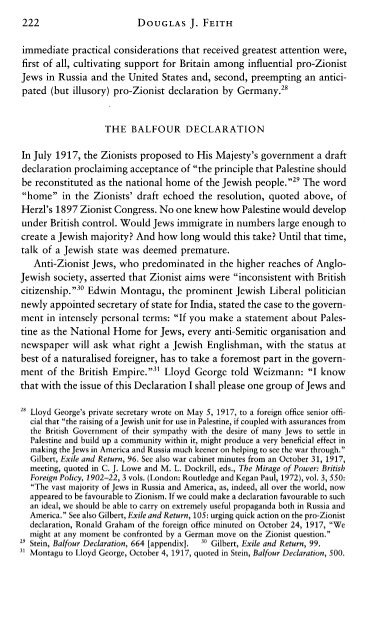Churchill, Palestine and Zionism, 1904-1922 - Douglas J. Feith
Churchill, Palestine and Zionism, 1904-1922 - Douglas J. Feith
Churchill, Palestine and Zionism, 1904-1922 - Douglas J. Feith
Create successful ePaper yourself
Turn your PDF publications into a flip-book with our unique Google optimized e-Paper software.
222 DOUGLAS J. FEITH<br />
immediate practical considerations that received greatest attention were,<br />
first of all, cultivating support for Britain among influential pro-Zionist<br />
Jews in Russia <strong>and</strong> the United States <strong>and</strong>, second, preempting an anticipated<br />
(but illusory) pro-Zionist declaration by Germany.28<br />
THE BALFOUR DECLARATION<br />
In July 1917, the Zionists proposed to His Majesty's government a draft<br />
declaration proclaiming acceptance of "the principle that <strong>Palestine</strong> should<br />
be reconstituted as the national home of the Jewish people. ,,29 The word<br />
"home" in the Zionists' draft echoed the resolution, quoted above, of<br />
Herzl's 1897 Zionist Congress. No one knew how <strong>Palestine</strong> would develop<br />
under British control. Would Jews immigrate in numbers large enough to<br />
create a Jewish majority? And how long would this take? Until that time,<br />
talk of a Jewish state was deemed premature.<br />
Anti-Zionist Jews, who predominated in the higher reaches of Anglo<br />
Jewish society, asserted that Zionist aims were "inconsistent with British<br />
citizenship. ,,30 Edwin Montagu, the prominent Jewish Liberal politician<br />
newly appointed secretary of state for India, stated the case to the government<br />
in intensely personal terms: "If you make a statement about <strong>Palestine</strong><br />
as the National Home for Jews, every anti-Semitic organisation <strong>and</strong><br />
newspaper will ask what right a Jewish Englishman, with the status at<br />
best of a naturalised foreigner, has to take a foremost part in the government<br />
of the British Empire.,,31 Lloyd George told Weizmann: "I know<br />
that with the issue of this Declaration I shall please one group of Jews <strong>and</strong><br />
28 Lloyd George's private secretary wrote on May 5, 1917, to a foreign office senior official<br />
that "the raising of a Jewish unit for use in <strong>Palestine</strong>, if coupled with assurances from<br />
the British Government of their sympathy with the desire of many Jews to settle in<br />
<strong>Palestine</strong> <strong>and</strong> build up a community within it, might produce a very beneficial effect in<br />
making the Jews in America <strong>and</strong> Russia much keener on helping to see the war through."<br />
Gilbert, Exile <strong>and</strong> Return, 96. See also war cabinet minutes from an October 31, 1917,<br />
meeting, quoted in C. J. Lowe <strong>and</strong> M. L. Dockrill, eds., The Mirage of Power: British<br />
Foreign Policy, 1902-22,3 vols. (London: Routledge <strong>and</strong> Kegan Paul, 1972), vol. 3, 550:<br />
"The vast majority of Jews in Russia <strong>and</strong> America, as, indeed, all over the world, now<br />
appeared to be favourable to <strong>Zionism</strong>. If we could make a declaration favourable to such<br />
an ideal, we should be able to carryon extremely useful propag<strong>and</strong>a both in Russia <strong>and</strong><br />
America." See also Gilbert, Exile <strong>and</strong> Return, 105: urging quick action on the pro-Zionist<br />
declaration, Ronald Graham of the foreign office minuted on October 24, 1917, "We<br />
might at any moment be confronted by a German move on the Zionist question."<br />
29 Stein, Balfour Declaration, 664 [appendix). 30 Gilbert, Exile <strong>and</strong> Return, 99.<br />
31 Montagu to Lloyd George, October 4, 1917, quoted in Stein, Balfour Declaration, 500.


